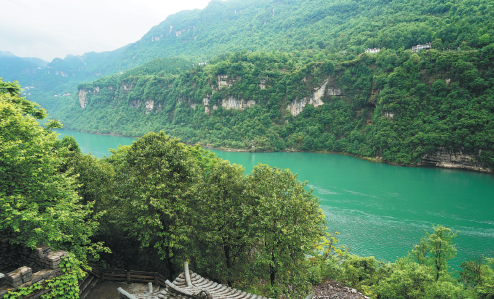A current of culture

Tourism routes along the Yangtze give visitors a taste of China's past and present, reports Xu Lin in Yichang, Hubei.
Arguably the best way to enjoy the beauty of the Yangtze River, one of China's "mother rivers", is to embark on a tourism cruise. Away from the hustle and bustle of daily life, tourists can savor tea and snacks onboard while enjoying the awe-inspiring currents and picturesque scenery on both banks of the river.
The cruise starts at Yichang city in Central China's Hubei province, known for the role it played in the wars of the Three Kingdoms (220-280) period. It is now home to some of the country's key water control projects.
"Two dams and one gorge", which refers to the Gezhouba Dam, the Three Gorges Dam, and Xiling Gorge between the two dams, has become a classic travel itinerary.
Gezhouba Dam, the first large-scale water control project constructed on the Yangtze River, was put into operation in 1981. The Three Gorges Dam, the world's largest hydropower project, has received over 10 million tourists in the past five years.
The cruise pulls in to shore and takes passengers to the Tribes of the Three Gorges, a scenic area that offers encounters with a variety of cultural experiences related to ethnic groups, such as those of the Tujia people.
There, tourists can visit different villages while hiking along the Yangtze River. Dressed in traditional ethnic costumes, performers sing folk songs, dance in groups and share folk customs with audiences.
Standing on a wooden bridge above a stream, one can enjoy an idyllic natural scene, the stuff of ancient Chinese poems.
Through the fog emerges a young woman in hanfu (traditional Chinese dress), playing a stringed instrument on a boat. Her peers dance on shore, traditional oil-paper umbrellas in hand.
Hop back onboard for the most amazing part of the journey — cruising downstream to upstream through the Three Gorges Dam, a vertical ascent of up to 113 meters.
The climb is made possible by the largest and most sophisticated vertical-hoist ship lift in the world. It allows small and medium-sized ships, with a maximum displacement of about 3,000 metric tons, to pass the dam within 40 minutes.
The Three Gorges Dam also has a five-tier ship lock exclusively for cargo ships. These large-sized vessels can traverse the dam within four hours.
As the tourist vessel, measuring 16.2 meters in width, slowly enters the 18-meter-wide ship lock, passengers have about 12 minutes to observe the water level change until it reaches its maximum height.
Standing on the deck, a breathtaking panorama unfolds before one's eyes, showcasing the grand dam and the surrounding scenery, which stretches to the horizon.
When the vessel reaches the other side, it enters Zigui county, the hometown of Qu Yuan, a patriotic poet from the Chu state during the Warring States Period (475-221 BC).
Legend has it that when the Chu state was doomed to be conquered by its rivals, Qu Yuan drowned himself in the Miluo River on the fifth day of the fifth lunar month, which is now known as Duanwu, or the Dragon Boat Festival.
On this festival, people around the country commemorate Qu Yuan by racing dragon boats and eating zongzi, a glutinous rice dumpling wrapped in bamboo or reed leaves.
After going ashore, the next stop is the Qu Yuan Temple, which was originally constructed during the Tang Dynasty (618-907) and rebuilt several times.
At the entrance of the traditional gate, with its exquisite decorations, an old man dressed in white attire, playing Qu Yuan, recites aloud the man's poetry, which echoes with rich Chinese philosophy.
There, onlookers can also have a bird's-eye view of the dam, situated a mere 600 meters away. The sight of this engineering marvel, together with the ambience of the gate, is unforgettable.
Zigui is also well-known for its juicy and sweet navel oranges, with an annual output of one million tons. Thanks to the presence of various orange species, these mouthwatering fruits are available throughout the year.
In Qu Yuan's poem Ju Song, or Ode to An Orange Tree, he praised an orange tree grown in the Chu state, which stood as a metaphor for the poet's own character, morals and pursuit of dreams.
The Ministry of Culture and Tourism recently unveiled 38 boutique travel routes on the Yangtze River, including the Three Gorges Project-themed tour involving destinations like Yichang and Chongqing.
Yichang offers various attractions for tourists to explore, encompassing its rich history, profound culture, and abundant opportunities for outdoor activities such as hiking, camping and rafting.
One notable example is Xingshan county, the hometown of Wang Zhaojun, renowned as one of the "four beauties" of ancient China.
During the Western Han Dynasty (206 BC-AD 24), she played an important role in establishing peace along the turbulent northern border, marrying the leader of the nomadic Xiongnu tribe.
In Yichang, diners can sample typical Hubei dishes, which tend to focus on river products, especially fish. Top 10 Hubei dishes include steamed fish, meat and vegetables, lotus root and pork rib soup, and yugao, or minced-fish cake.
At the night market, there are a variety of yummy snacks on offer to satisfy cravings, such as fried small potatoes or radish-filled dumplings. Summer is the best time to indulge in the iconic spicy crayfish, a midnight snack beloved across the country that originates in Hubei.
A romantic way to end the trip is to board a night ship along the Yangtze River and enjoy beautiful fireworks.
On one side of the river stands Moji Mountain, adorned with vibrant green lights that illuminate its grandeur. Gazing upon the river, the mountain's reflection creates a captivating scene reminiscent of a Chinese landscape painting. Spanning the river, the city's magnificent bridges showcase its connection to the waterway, embodying both Yichang's history and architectural splendor.
Contact the writer at xulin@chinadaily.com.cn























